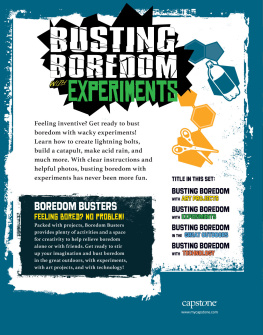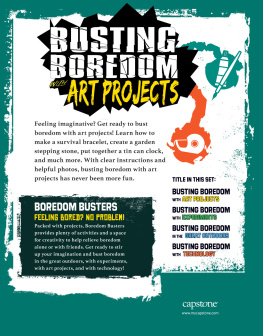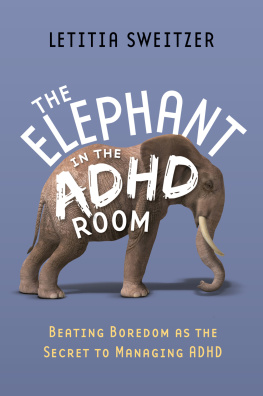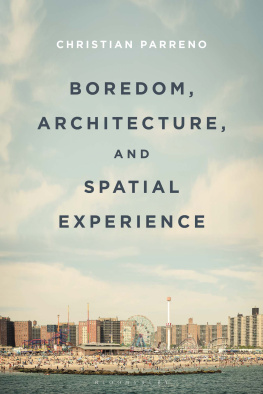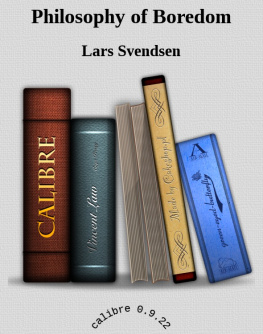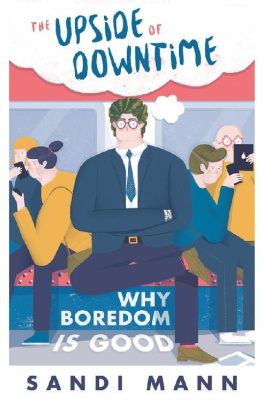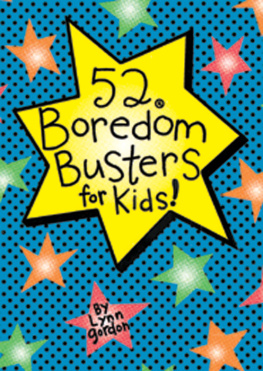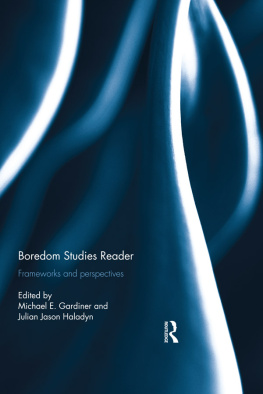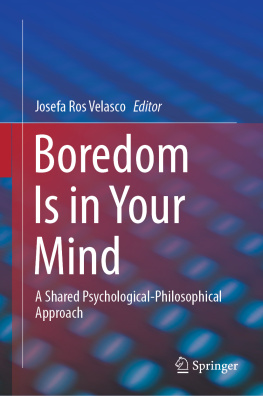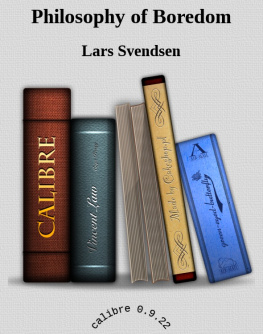Haladyn - Boredom and Art: Passions of the Will To Boredom
Here you can read online Haladyn - Boredom and Art: Passions of the Will To Boredom full text of the book (entire story) in english for free. Download pdf and epub, get meaning, cover and reviews about this ebook. City: Washington;Mass;Winchester, year: 2015, publisher: John Hunt (NBN);Zero Books, genre: Religion. Description of the work, (preface) as well as reviews are available. Best literature library LitArk.com created for fans of good reading and offers a wide selection of genres:
Romance novel
Science fiction
Adventure
Detective
Science
History
Home and family
Prose
Art
Politics
Computer
Non-fiction
Religion
Business
Children
Humor
Choose a favorite category and find really read worthwhile books. Enjoy immersion in the world of imagination, feel the emotions of the characters or learn something new for yourself, make an fascinating discovery.

- Book:Boredom and Art: Passions of the Will To Boredom
- Author:
- Publisher:John Hunt (NBN);Zero Books
- Genre:
- Year:2015
- City:Washington;Mass;Winchester
- Rating:3 / 5
- Favourites:Add to favourites
- Your mark:
- 60
- 1
- 2
- 3
- 4
- 5
Boredom and Art: Passions of the Will To Boredom: summary, description and annotation
We offer to read an annotation, description, summary or preface (depends on what the author of the book "Boredom and Art: Passions of the Will To Boredom" wrote himself). If you haven't found the necessary information about the book — write in the comments, we will try to find it.
Haladyn: author's other books
Who wrote Boredom and Art: Passions of the Will To Boredom? Find out the surname, the name of the author of the book and a list of all author's works by series.
Boredom and Art: Passions of the Will To Boredom — read online for free the complete book (whole text) full work
Below is the text of the book, divided by pages. System saving the place of the last page read, allows you to conveniently read the book "Boredom and Art: Passions of the Will To Boredom" online for free, without having to search again every time where you left off. Put a bookmark, and you can go to the page where you finished reading at any time.
Font size:
Interval:
Bookmark:
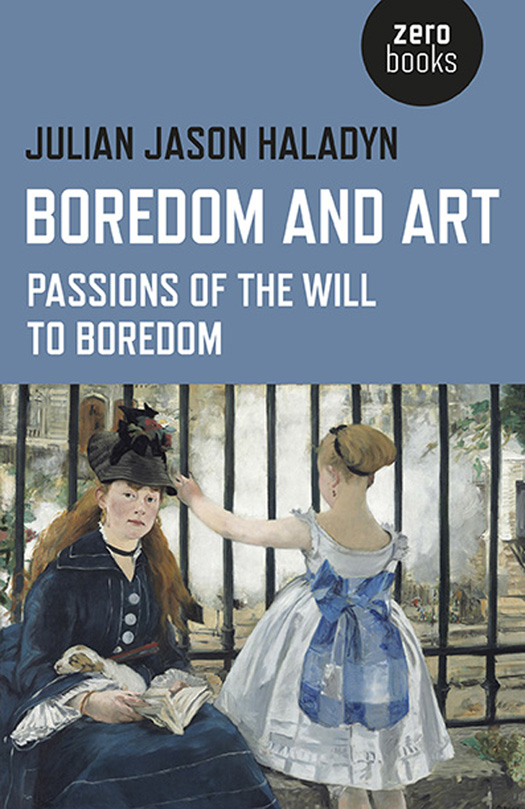
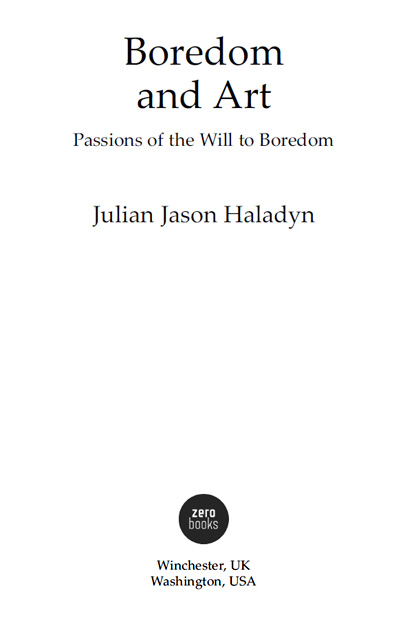
First published by Zero Books, 2015
Zero Books is an imprint of John Hunt Publishing Ltd., Laurel House, Station Approach,
Alresford, Hants, SO24 9JH, UK
www.johnhuntpublishing.com
www.zero-books.net
For distributor details and how to order please visit the Ordering section on our website.
Text copyright: Julian Jason Haladyn 2014
ISBN: 978 1 78279 998 6
Library of Congress Control Number: 2015933779
All rights reserved. Except for brief quotations in critical articles or reviews, no part of this book may be reproduced in any manner without prior written permission from the publishers.
The rights of Julian Jason Haladyn as author have been asserted in accordance with the Copyright, Designs and Patents Act 1988.
A CIP catalogue record for this book is available from the British Library.
Design: Stuart Davies
Printed and bound by CPI Group (UK) Ltd, Croydon, CR0 4YY, UK
We operate a distinctive and ethical publishing philosophy in all areas of our business, from our global network of authors to production and worldwide distribution.
For Miriam,
Look out! Another boring mushroom
The idea for this book can be traced back to a graduate class I attended at the University of Western Ontario, taught by my former PhD supervisor and now colleague Michael E. Gardiner. Michaels continuing advice and support has been invaluable. For their early support of this project I thank Jan Plug, Vernica Schild and Antonio Calcagno. A special thanks also goes to Elizabeth Goodstein, whose pre-eminent work in the field of boredom studies and support of my ideas helped form this book.
Throughout the process of completing this project I had the support of many people. For their commentary and advice I thank Janice Gurney, Andy Patton, Ron Benner and Mireya Folch-Serra, as well as Thomas Lennon for his help with all things Descartes. For their endless encouragement and support I am grateful to my family: Susan, Andy, Kimberly and Donovan. And for their invaluable help preparing and editing the final manuscript I am indebted to Elizabeth Legge, Madeline Lennon and Jamelie Hassan.
Most of all I thank my partner Miriam Jordan. She helped me at every level of this project, from listening to my crazy theories over coffee to editing through my writing and giving me valuable commentary. Without Miriam this book would not have been possible.
Early versions of three chapters have appeared previously. Warhols Films, published in Kinema: A Journal of Film and Audiovisual Media 35 (Spring 2011).
. douard Manet, The Railway, 1873
Courtesy National Gallery of Art, Washington
. Julian Haladyn, photograph of Berlin Altes Museum, 2013
. Photograph of group, Visit Saint Julien le Pauvre, 1921
Courtesy Bibliothque Littraire Jacques Doucet
. Handbill, Excursions & Visites Dada, 1921
Photograph by Julian Haladyn
. Guy Debord and Asger Jorn, Psychogeographic Guide of Paris, 1956
. Guy Debord and Asger Jorn, Naked City, 1957
. Andy Warhol, still from Poor Little Rich Girl, 1965
. Chantal Akerman, still from Jeanne Dielman, 1975
The modern conception of boredom develops at the end of the 18th and beginning of the 19th century, within the same time-period as the establishment of the nation-state and the growth of industrialization and consumerism. Unlike previous social afflictions associated with select groups and individuals within cultures or even as a phenomenon of privilege typically restricted to people of specific classes such as horror loci, taedium vitae, acedia and melancholy boredom is an experience open to all citizens of modernity. In her important study Experience without Qualities: Boredom and Modernity, Elizabeth Goodstein convincingly argues for what she calls the democratization of boredom in which the conditions of mass leisure allowed an initially elitist discourse of subjective disaffection to gradually take hold in popular culture, so that by the early twentieth century the experience of ennui had become truly universal (99). The succession of affections or conditions that ends with modern boredom arguably forms a genealogy of human malaise, with each registering deficiencies of social experience within a particular historical period, be it from a moral or psychological, mundane or philosophical perspective.
From this point of view, being bored is just our way of naming the present manifestation of this discontent. Quite distinct from any early malady of this kind, however, is what Walter Benjamin describes as the epidemic proportions of boredom as a specifically modern phenomenon directly related to mass culture. It is not simply a matter of immediacy that distinguishes this condition from others of its kind, but the fact that people of all classes, races and genders within modern cultures can share in this experience without substantive difference. The boredom of a housewife or factory worker is no less significant than that of a politician or philosopher.the most compelling attributes of this condition are precisely those that give it such a democratizing affect to which every individual is susceptible and inevitably experiences it as a consistent and often unavoidable part of life in the modern world.
As such, studies of boredom are faced with the inescapable problem of attempting to differentiate and even reconcile individualized attributes of this affliction with those that are more collective or social. Being bored is regarded primarily as the private experience of a given person, yet it is one shared generally by a multitude of people so many in fact that it can be viewed as an assumed response indicative of anyone who is not fully engaged or, more precisely, entertained at a given moment or by a given object or event. On the one hand, it would be a misnomer to claim that such an experience is completely subjective, raising the question of why boredom is so culturally diffuse. On the other hand, to believe that a subjects boring encounter with an object or situation remains entirely external appears equally absurd, particularly considering the profoundly personal affects and effects of this condition. As a discursively articulated phenomenon, Goodstein explains, boredom is at once objective and subjective, emotion and intellectualization not just a response to the modern world but also an historically constituted strategy for coping with its discontents (3). This borderland of discontented experience that the term boredom attempts to communicate resides firmly in the back-and-forth relationship between the subject and the world: it exists as a corollary or by-product of the specifically modern visions of human existence. In this capacity, the bored subject is one driven to seek a level of personal and cultural engagement that is not present, one whose interactions with the world are, or at least continually are made to feel, historically and culturally absent or nullified, in which life appears without purpose or meaning as a result of fixed, ready-made ways of living and thinking.
We see instantly a correlation between the emergence of modernization, most notably the mass-production of the industrial revolution, and the onset of boredom in modernity. Much of the literature on boredom highlights the relationship between our consumer-based culture and the apparent decrease in peoples attention spans, which in all likelihood is the result of the promotion of disposable objects and constantly changing interests (often treated positively by referring to them as trends). As a result, our desires are typically satiated only temporarily when treated to new forms of stimuli. We expect to be constantly entertained, so much so that we judge every aspect of our daily lives in terms of how it holds our
Font size:
Interval:
Bookmark:
Similar books «Boredom and Art: Passions of the Will To Boredom»
Look at similar books to Boredom and Art: Passions of the Will To Boredom. We have selected literature similar in name and meaning in the hope of providing readers with more options to find new, interesting, not yet read works.
Discussion, reviews of the book Boredom and Art: Passions of the Will To Boredom and just readers' own opinions. Leave your comments, write what you think about the work, its meaning or the main characters. Specify what exactly you liked and what you didn't like, and why you think so.

